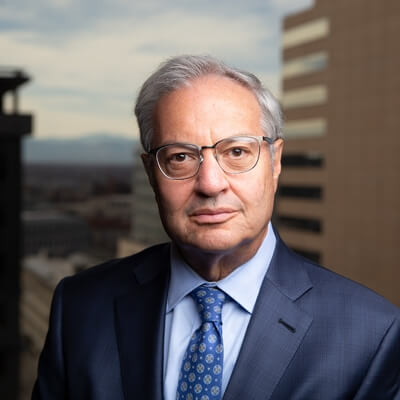Our Denver Wrongful Death Lawyers Are Backed By 40+ Years Of Experience
Everyone knows what happens if they are injured in a car accident – the negligent driver’s insurance (or the victim’s insurance) should pay for the driver’s failure to act as a prudent person. But what happens when a person is killed as a result of another’s negligence or wrongful act? Colorado’s wrongful death laws can assist a family in their pursuit of justice for the tragic loss of a loved one. If you have lost a family member in Denver or the surrounding cities, an experienced Denver wrongful death lawyer at Springer & Steinberg, P.C. can help you explore your options.
Our understanding of case law and legislation pertaining to wrongful death actions is unparalleled, with our nearly 40 years of experience representing Colorado’s injured and wronged. We are ready to put our resources and know-how to work for you as you seek justice in your loved one’s name.
Call 303-861-2800 or contact us online today to learn how our Denver wrongful death lawyers can help you hold the at-fault party or parties responsible for your loss.
Navigate This Page

Colorado Wrongful Death Statute
Colorado Revised Statutes §§ 13-21-201 through 13-21-204, Colorado’s wrongful death act, applies in all cases in which someone dies as the result of another’s negligence. This act gives the decedent’s family the ability to pursue legal action against the responsible party in the same manner as if the decedent had lived.
Wrongful Death Statute of Limitations
Like most other personal injury actions, wrongful death lawsuits in Colorado are subject to a statute of limitations that sets a strict deadline on how long plaintiffs have to file a civil claim. All wrongful death lawsuits must be filed within two years of the date of death.
If you attempt to file a wrongful death lawsuit after this period has expired, the court will almost certainly dismiss your claim, and you will be unable to pursue further legal action. Since compliance with the statute of limitations can ultimately make or break your claim, it is important that you retain skilled legal representation as soon as possible to guard your family’s rights.
Proving Negligence in a Wrongful Death Claim
If the reason a person dies is due to the negligent actions of another person, the claimant must show, by a preponderance of the evidence, four basic elements:
- Duty
- Breach of duty
- Causation
- Damages
The case is the same as if they survived, and so are any defenses that would have been available to the defendant. For example, if the decedent was partially at fault in an accident that led to his or her death, the defendant may ask for a proportionate reduction of damages under the doctrine of modified comparative fault. (Unfortunately, this doctrine may bar recovery if the decedent is found to be 51% or more responsible for the accident.) Comparative negligence is covered in Colorado Revised Statutes § 13-21-111.
Who is Eligible to File a Wrongful Death Claim?
The State of Colorado has codified the law of wrongful death, found in §§ 13-21-201 through 13-21-204. Generally, only the surviving spouse, if there is one, may pursue litigation during the first year following the decedent’s death. In some cases, a spouse can choose to include the decedent’s heirs in the suit.
In cases where the surviving spouse brings the action, he or she does so both in an individual capacity and on behalf of any and all children of the deceased. During the second year after the decedent’s passing, the spouse, the heirs, or the designated beneficiary may bring a wrongful death claim. They may bring their claims separately, or they may join them together.
Call Springer & Steinberg, P.C. at 303-861-2800 today to talk with an experienced wrongful death attorney.
Denver Wrongful Death Damages
The key components of a wrongful death claim are similar to those related to other negligence-based suits. A successful wrongful death lawsuit is one in which three important aspects can be proven:
- The defendant had a duty of care owed to the deceased individual. Essentially, this means that the party was responsible for acting with reasonable care to ensure that the victim did not suffer harm. For example, you may choose to file a suit against a drunk driver who caused a fatal accident that led to a loved one’s unexpected death. The driver had a duty of care to adhere to all laws and regulations. Doing so would avoid injuring anyone through their actions or negligence.
- The defendant breached their duty of care. Individuals can be described as being “in breach” of their duty if they do not fulfill their legal responsibilities. A drunk driver breaches their duty of care when they decide to drive while under the influence, which violates the law.
- The defendant’s breach of duty resulted in the death of the victim. If the defendant’s actions led to a victim’s death, they may be held liable. The drunk driver, in our example, caused an accident that killed a victim, so their breach of duty can be clearly linked to the tragedy and result in them being held liable.
Potential Damages for the Loss of a Family Member
Determining the amount of damages that may be available to wrongful death claimants can be extremely complicated. This is because of the various factors that come into play, such as the circumstances of the decedent’s death, whether the defendant was a governmental entity, and so forth. Some of the damages that may be available include economic damages, such as funeral costs and financial benefits lost due to the decedent’s death, and non-economic damages, like compensation for grief and emotional stress. Punitive or exemplary damages sometimes may be available (in accordance with § 13-21-102).
In addition to wrongful death damages for qualified claimants under the § 13-21-102: Exemplary Damages Act, the Colorado Survival Statute allows for the recovery of a decedent’s pre-death pecuniary losses, such as medical expenses and lost wages, in situations in which the decedent was not killed instantly but instead lingered for a time before succumbing to his or her injuries.
Common Causes of Wrongful Death in Denver, CO
In Denver, wrongful death cases can involve a broad range of circumstances. Among the most common factors contributing to wrongful deaths are:
- Motor vehicle accidents (including reckless driving, speeding, driving while intoxicated, driving while fatigued, etc.)
- Motorcycle accidents
- Truck accidents
- Bicycle accidents
- Pedestrian accidents
- Premises liability cases
- Medical malpractice or negligence
- Defective products (including medications)
- Nursing home abuse
- Workplace injuries/accidents
- Criminal acts
The list above is just a short series of examples and should not be considered all-inclusive. If your loved one died as a result of another person’s wrongful actions or negligence, you may be able to take legal action to demand justice. At Springer & Steinberg, our knowledgeable wrongful death lawyers can provide you with a clearer understanding of your options – we are here to help.
Did you lose a loved one to recklessness or negligence? Contact the law offices of Springer & Steinberg, P.C. today at 303-861-2800 for dedicated representation.
Potential Compensation in a Wrongful Death Claim
In a wrongful death case, the types of damages paid are for the harms experienced by the individual’s surviving family members or dependents.
The liable party can be held responsible for providing monetary compensation for damages. Potential wrongful death claim compensation can cover both economic and non-economic damages.
Economic Damages
- Medical bills of the deceased individual, specifically related to injuries they sustained in the wrongful death accident
- Lost wages and future earnings resulting from the injuries and death of the deceased
- Other financial compensation owed to the deceased’s family members that were lost due to the victim’s death
- Funeral expenses and burial costs for the victim
Non-Economic Damages
- Emotional and mental stress caused by the death
- Loss of emotional support that the victim provided
In Colorado, wrongful death damage caps apply to non-economic damages. A cap is a set limitation on the amount of financial compensation you can recover. Presently, wrongful death non-economic damage caps in CO are set at $571,870 for incidents occurring on or after January 1, 2020.
Other Wrongful Death Damages
In certain cases, a defendant can also be liable for “punitive” or “exemplary” damages if it is determined that their conduct was clearly dangerous rather than simply negligent.
There are also “statutory” damages that can be awarded to a plaintiff if the defendant has violated a specific statute related to damages (such as a statute regulating the unfair delay of an insurance payment).
You must partner with an experienced wrongful death attorney in CO to ensure that you recover the full amount of damages you rightfully deserve.
Contact a Denver Wrongful Death Lawyer for a Free Consultation!
If your family lost a loved one because of a negligent or reckless person, company, or arm of the government, you should not delay in speaking to an experienced Denver wrongful death lawyer at Springer & Steinberg about your right to pursue compensation.
In addition to risking dismissal of your case on the grounds of untimeliness, a delay in seeking counsel from a personal injury attorney can also result in a reduction of compensation due to the spoliation of evidence. Unfortunately, accident scenes can change over time, and witnesses’ memory can fade. Unless critical evidence and statements are preserved early on, it can be difficult to prove a case in court later.
Call us at 303-861-2800 or contact us online to schedule a free evaluation of your case.









